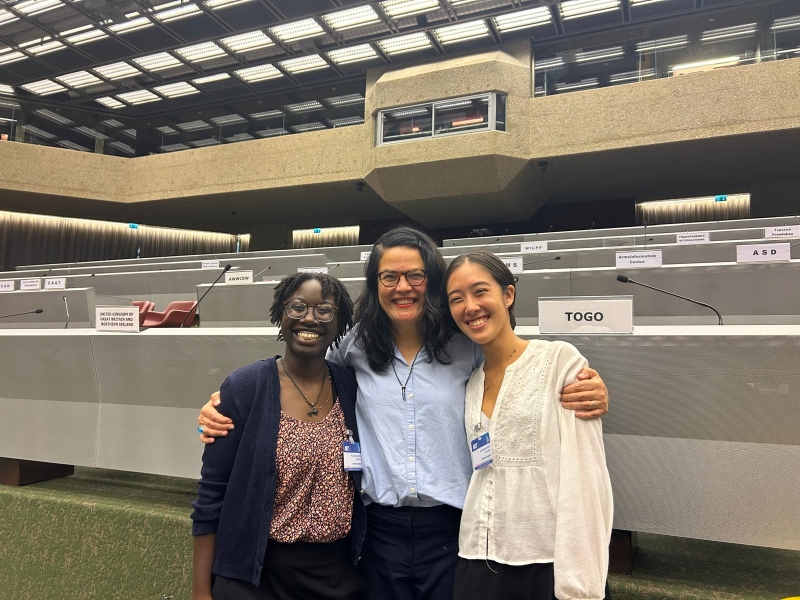 / Disarmament Initiatives in Switzerland
Subscribe
/ Disarmament Initiatives in Switzerland
Subscribe

Control Arms is a non-governmental organization that brings together other organizations to advocate for the reduction of human suffering that is fueled by arms transfers. They also advocate for the implementation and universalization of the Arms Trade Treaty (ATT) which regulate countries arms transfers.
It was a hybrid internship, but I travelled to Geneva, Switzerland, for the month of August. I completed logistical and preparatory work for the 11th Conference of State Parties (CSP11). The CSP11, a week-long conference at the end of August, is mostly a chance for countries to talk about their progress and challenges in implementing and enforcing the ATT.
During CSP11, I was extremely busy! I was taking notes from delegates representing different countries, NGOs and civil societies. I also ensured that the side events we planned went smoothly, distributed financial reimbursements, helped our sponsored delegates with their speeches, captured photo and video content to be used for Control Arms website and YouTube, and ensured our sponsored delegates knew the plan of action daily.
Some of my other work included creating and updating their social media presence and conducting research. I researched the global increase in militarization, how the increased military cost impacts humanitarian assistance, and impacts other public services such as education and healthcare. A part of my work that I found exciting to me was that I had the opportunity to collaborate with the team on potential website changes and format the suggested changes.
I lived just across the France-Switzerland border. Every day, I would take the bus with another Albright fellow who I interned with, Annette Chun. On weekends, we would explore Geneva and even took a day a day trip to Interlaken (~3 hours away). We initially got lost a few times taking the public transportation and had to get off at random stops and figure out the right bus to take. To our surprise, we also found out that there were ticket checkers on the buses and that each bus usually comes right on time!
Our day-to-day was never really the same. We had the opportunity to join in on a lot of interesting meetings and events. For instance, we went to the Biological Weapons Conference at the UN, which was an excellent chance to connect my major, Political Science, and minor, Biology. They mostly talked about the impact of AI, threats of disinformation and the misuse of biological weapons.
The topics at the CSP11 were about the humanitarian crises in countries such as Yemen, Sudan, DRC, and Gaza, gender-based violence, violence against children, ATT universalization barriers, and the necessity of enforcing Articles 6 and 7.
Articles 6 and 7 state that countries who signed the treaty should prohibit and mitigate any transfer of conventional arms if they have knowledge or come into knowledge that the arms they transfer would be used to violate international law and human rights, such as the Geneva Conventions of 1949 or to commit genocide and crimes against humanity.
What I found to be challenging working in international politics is that treaties can appear to be just for show and are not actionable because of loopholes and lack of enforcement. For instance, countries can utilize different interpretations of terms present in the ATT such as “genocide” and “knowledge” to skirt around their legal obligations.
At the end of the internship, we were gifted coffee biscuits and Tajín from two of our sponsored delegates from Colombia and Mexico, had lunch with our director, Hine-Wai, and grabbed ice cream with a previous Control Arms intern! It was bittersweet; however, I enjoyed the time I spent learning and working at Control Arms. In the future I hope to continue to learn how to write, dissect, and understand legal documents, policies, and treaties, as well as work on ensuring they are well enforced.





